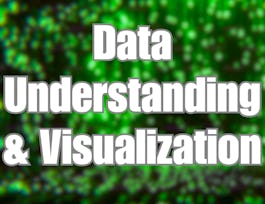This course covers the essential exploratory techniques for summarizing data. These techniques are typically applied before formal modeling commences and can help inform the development of more complex statistical models. Exploratory techniques are also important for eliminating or sharpening potential hypotheses about the world that can be addressed by the data. We will cover in detail the plotting systems in R as well as some of the basic principles of constructing data graphics. We will also cover some of the common multivariate statistical techniques used to visualize high-dimensional data.

Schenken Sie Ihrer Karriere Coursera Plus mit einem Rabatt von $160 , der jährlich abgerechnet wird. Sparen Sie heute.


Exploratory Data Analysis
Dieser Kurs ist Teil mehrerer Programme.



Dozenten: Roger D. Peng, PhD
179.757 bereits angemeldet
Bei  enthalten
enthalten
(6,068 Bewertungen)
Was Sie lernen werden
Understand analytic graphics and the base plotting system in R
Use advanced graphing systems such as the Lattice system
Make graphical displays of very high dimensional data
Apply cluster analysis techniques to locate patterns in data
Kompetenzen, die Sie erwerben
- Kategorie: Cluster Analysis
- Kategorie: Ggplot2
- Kategorie: R Programming
- Kategorie: Exploratory Data Analysis
Wichtige Details

Zu Ihrem LinkedIn-Profil hinzufügen
2 Aufgaben
Erfahren Sie, wie Mitarbeiter führender Unternehmen gefragte Kompetenzen erwerben.

Erweitern Sie Ihre Fachkenntnisse
- Lernen Sie neue Konzepte von Branchenexperten
- Gewinnen Sie ein Grundverständnis bestimmter Themen oder Tools
- Erwerben Sie berufsrelevante Kompetenzen durch praktische Projekte
- Erwerben Sie ein Berufszertifikat zur Vorlage


Erwerben Sie ein Karrierezertifikat.
Fügen Sie diese Qualifikation zur Ihrem LinkedIn-Profil oder Ihrem Lebenslauf hinzu.
Teilen Sie es in den sozialen Medien und in Ihrer Leistungsbeurteilung.

In diesem Kurs gibt es 4 Module
This week covers the basics of analytic graphics and the base plotting system in R. We've also included some background material to help you install R if you haven't done so already.
Das ist alles enthalten
15 Videos6 Lektüren1 Aufgabe5 Programmieraufgaben1 peer review
Welcome to Week 2 of Exploratory Data Analysis. This week covers some of the more advanced graphing systems available in R: the Lattice system and the ggplot2 system. While the base graphics system provides many important tools for visualizing data, it was part of the original R system and lacks many features that may be desirable in a plotting system, particularly when visualizing high dimensional data. The Lattice and ggplot2 systems also simplify the laying out of plots making it a much less tedious process.
Das ist alles enthalten
7 Videos1 Lektüre1 Aufgabe5 Programmieraufgaben
Welcome to Week 3 of Exploratory Data Analysis. This week covers some of the workhorse statistical methods for exploratory analysis. These methods include clustering and dimension reduction techniques that allow you to make graphical displays of very high dimensional data (many many variables). We also cover novel ways to specify colors in R so that you can use color as an important and useful dimension when making data graphics. All of this material is covered in chapters 9-12 of my book Exploratory Data Analysis with R.
Das ist alles enthalten
12 Videos1 Lektüre4 Programmieraufgaben
This week, we'll look at two case studies in exploratory data analysis. The first involves the use of cluster analysis techniques, and the second is a more involved analysis of some air pollution data. How one goes about doing EDA is often personal, but I'm providing these videos to give you a sense of how you might proceed with a specific type of dataset.
Das ist alles enthalten
2 Videos2 Lektüren1 Programmieraufgabe1 peer review
Dozenten

Empfohlen, wenn Sie sich für Data Analysis interessieren

Duke University

University of Colorado Boulder
Warum entscheiden sich Menschen für Coursera für ihre Karriere?




Bewertungen von Lernenden
Zeigt 3 von 6068
6.068 Bewertungen
- 5 stars
74,29 %
- 4 stars
21,13 %
- 3 stars
3,39 %
- 2 stars
0,74 %
- 1 star
0,42 %
Geprüft am 5. Juni 2020
Geprüft am 23. Mai 2019
Geprüft am 17. Jan. 2016

Neue Karrieremöglichkeiten mit Coursera Plus
Unbegrenzter Zugang zu über 7.000 erstklassigen Kursen, praktischen Projekten und Zertifikatsprogrammen, die Sie auf den Beruf vorbereiten – alles in Ihrem Abonnement enthalten
Bringen Sie Ihre Karriere mit einem Online-Abschluss voran.
Erwerben Sie einen Abschluss von erstklassigen Universitäten – 100 % online
Schließen Sie sich mehr als 3.400 Unternehmen in aller Welt an, die sich für Coursera for Business entschieden haben.
Schulen Sie Ihre Mitarbeiter*innen, um sich in der digitalen Wirtschaft zu behaupten.
Häufig gestellte Fragen
Access to lectures and assignments depends on your type of enrollment. If you take a course in audit mode, you will be able to see most course materials for free. To access graded assignments and to earn a Certificate, you will need to purchase the Certificate experience, during or after your audit. If you don't see the audit option:
The course may not offer an audit option. You can try a Free Trial instead, or apply for Financial Aid.
The course may offer 'Full Course, No Certificate' instead. This option lets you see all course materials, submit required assessments, and get a final grade. This also means that you will not be able to purchase a Certificate experience.
When you enroll in the course, you get access to all of the courses in the Specialization, and you earn a certificate when you complete the work. Your electronic Certificate will be added to your Accomplishments page - from there, you can print your Certificate or add it to your LinkedIn profile. If you only want to read and view the course content, you can audit the course for free.
If you subscribed, you get a 7-day free trial during which you can cancel at no penalty. After that, we don’t give refunds, but you can cancel your subscription at any time. See our full refund policy.



